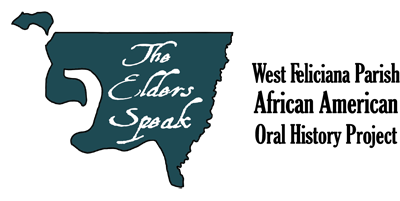
The Elders Speak: The West Feliciana Parish African American Oral History Project
By Teresa Parker Farris

Sources
Carter, Travis. Interview by Teresa Parker Farris on August 19, 2004 at his home in Zachary.
Cavalier, Rev. Zack. Interview by Teresa Parker Farris on August 10, 2005 at his home in the Solitude community.
Gilmore, Sr., William J. Interview by Teresa Parker Farris on July 1, 2004 at his home in the Hollywood community.
Hardy, Ellen Douglas. Interview by Teresa Parker Farris on June 8, 2005 at her home in St. Francisville.
Johnson, Alice Lee. Interview by Teresa Parker Farris on August 11, 2004 at her home in St. Francisville.
Lee, Elizabeth. Interview by Teresa Parker Farris on June 16, 2005 at her home in the Solitude community.
London, Geraldine. Interview by Teresa Parker Farris on August 12, 2004 at her home in the Solitude community.
Mackie, Sallie Duncan Whitfield. Interview by Teresa Parker Farris on August 19, 2004 at her home in the Solitude community.
Norflin, Rev. George. Interview by Teresa Parker Farris on August 4, 2005 at his home in St. Francisville.
Pate, Rosia. Interview by Teresa Parker Farris on August 4, 2005 at her home on Tunica Trace near Greenwood Plantation.
Pate, Violet Whitfield. Interview by Teresa Parker Farris on June 24, 2004 at her home in the Bains community.
Richardson, Turlie Harris. Interview by Teresa Parker Farris on August 18, 2004 at the Council on Aging in St. Francisville.
Smith, Sally Roach. Interview by Teresa Parker Farris on August 12, 2004 at the Council on Aging in St. Francisville.
Sterling, Sr., Robert. Interview by Teresa Parker Farris on August 3 and 10, 2005 at his home in the Laurel Hill community.
Williams, Louise Cathern. Interview by Teresa Parker Farris on June 30, 2004 at her home in the Weyanoke community.
Further Reading
Additional information about West Feliciana Parish and its African American history may be found in the following as well as various articles from the St. Francisville Democrat.
Adelman, Bob. "Birth of a Voter: Louisiana Parish Registers 1st Negro in 61 Years." Ebony, February 1964, 88-98. Also see the Adelman online archive: http://www.bobadelman.net/galleries/core/louisiana/
De Jong, Greta. A Different Day: African American Struggles for Justice in Rural Louisiana, 1900-1970 (Chapel Hill, NC: University of North Carolina Press, 2002).
Durant, Thomas J., Jr. "The Enduring Legacy of an African-American Plantation Church." Journal of Negro History 80, no. 2 (spring 1995): 81-95.
Hall, Wendell H., "The History of Public Education in West Feliciana Parish 1893 to 1964." Ph.D. diss., Louisiana State University, 1966.
Acknowledgements
The site documentation and interviews were funded by the Davis Family Foundation through the West Feliciana Parish African-American Heritage Task Force. Individuals instrumental to the project included Susan and Donny Davis of the Davis Family Foundation, Rolanda Robinson from St. Francisville's Community Development Foundation, Ken Dawson of the West Feliciana Parish African-American Heritage Task Force, Lillie Pinkney from the West Feliciana Parish Council on Aging, interviewee Geraldine London, and local historian Elizabeth K. Dart.
Davis Family Foundation
The Davis Family Foundation was established in 2000 by the children of Roscoe and Evelyn Davis in memory of their parents. Through its grants program, the foundation honors key values of the Davis family by encouraging individuals to pursue activities that foster independence, hard work, passionate commitment, and entrepreneurial efforts. In 2002, the Davis Family Foundation chose the West Feliciana African-American Heritage Task Force as a sponsoring organization through which to award a grant.
African-American Heritage Task Force
Established in 2002, the objectives of the Task Force are five-fold: discover the historic roles and contributions of African Americans in the history of West Feliciana parish; develop vehicles for preserving and sharing the stories and knowledge that emerge from the research; identify opportunities for developing African-American heritage tourism; serve as a catalyst for business and economic development; and break down barriers to promote ethnic and racial harmony.
St. Francisville Area Foundation
The St. Francisville Area Foundation [hyperlink: http://www.stfrancisvilleaf.org/] is a non-profit established in 1998 to support initiatives that protect, restore, and enhance the natural beauty and cultural charm of the local community.
Researcher
Teresa Parker Farris is an instructor of folklife at Tulane University where she is also completing her doctoral studies in the Department of History. She holds an M.A. in Southern Studies from the University of Mississippi and a B.A. in English Literature from Haverford College. Her previous positions include Deputy Director of the Newcomb Art Museum; Cultural Programs Manager at the New Orleans Jazz and Heritage Festival; and Assistant Director of the Oxford Tourism Council & Film Commission. She serves as Chair of the Louisiana Folklife Commission, an advisory board for the state's folklife program, as well as on the New Orleans Jazz & Heritage Festival's cultural programs advisory panel and on the board of the New Orleans Master Crafts Guild. She was a co-editor and author of A Unique Slant of Light: The Bicentennial History of Art in Louisiana and has essays in the Museum of American Folk Art's Self-Taught Artists of the 20th Century: An American Anthology, the Center for the Study of Southern Culture's Encyclopedia of Southern Culture, and KnowLA: The Digital Encyclopedia of Louisiana History and Culture.
T. Harry Williams Center for Oral History
The original audio recordings for the project are archived in Louisiana State University's Library Special Collections through the T. Harry Williams Center for Oral History. The Williams Center administers a collection of more than 2,500 tape-recorded interviews totaling more than 3,000 hours of tape. The mission of the Williams Center is to collect and preserve, through the use of tape-recorded interviews, unique and valuable information about Louisiana history that exists only in people's memories and would otherwise be lost. It is recognized throughout the state as a valuable source of assistance and information on using oral history techniques to record local, family, and institutional history.



